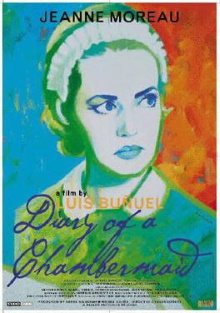This is one of Luis Buñuel’s least surrealist films and it’s straightforward to understand every one of the side-plots going on, yet it leaves me confused as to what is the point of it all. I believe that it’s necessary to view this from the perspective of the time it is set in, with France embroiled by the Dreyfus Affair and antisemitism on the rise. That it condemns the perversions of the bourgeoisie is obvious too but then it doesn’t exactly portray the servant class in a kindly light either. I suppose that too is one of the contradictions of the original novel this was based on.
Parisian Célestine arrives in the countryside to work as a maid in a small chateau. She is immediately remarked upon as being unusually attractive and stylishly dressed for the village. The lady of the manor Mrs. Monteil gives her extensive instructions, in particular admonishing her not to break the many expensive vases and lamps in the house, and she is to please her father Mr. Rabour above all. The lustful husband Mr. Monteil immediately tries to hit on her as his wife doesn’t have sex with him, claiming that sex is too painful for her. Meanwhile the elderly Mr. Rabour who once made his fortune as a cobbler, seems to have a fetish for watching attractive women wear the shoes he made and asks her to model for him. Even the groom Joseph, who is fiercely anti-Semitic and patriotic, wants her. Yet Célestine is far from being a helpless victim as she deftly juggles all of them for her own advantage. When a poor little girl, Claire, from the village ends up raped and killed, Célestine is determined to get justice for her.
As the diary in the title suggests, in lieu of a single main plot, this feels more like a series of short portraits of the various characters Célestine gets to know, together with their eccentricities and perversions. Even Mrs. Monteil who seems completely uninterested in sex is odd to say the least, caring much more for how much her husband’s liaisons costs her in terms of money rather than being jealous. The decadent nature of the relationships extend to the neighbor of the Monteils as well, a retired soldier who thinks nothing of bedding his own maid. The structure is so loose that I found myself being confused when the character of Claire pops up without establishing who she is, simply being a girl from the village Célestine takes a liking to. Even when the focus moves to Célestine trying to get justice for Claire, it’s hard to know how seriously to take it as she proceeds in such indirect ways and this doesn’t feel at all like a crime drama.
I understand that the source material is a favorite for adapting into films and plays and this is considered to be one of the less literal attempts. I like that Célestine has agency even as nearly all of the men she meets just wants sex from her and is able to selectively keep them at bay or tease them as best serves her interests. Even as she works as a maid, she is able to assert herself to some extent against Mrs. Monteil and isn’t completely submissive. As for the larger critique of French society of the period, I suppose the point is that even though the landed gentry are awful for exploiting their servants, that doesn’t mean that the members of the lower classes are automatically good people. As I mentioned though, this works best when interpreted in the context of the time with the dissatisfaction fueling the rise of fascism and anti-Semitism. The link that Buñuel establishes here isn’t quite visceral enough for me though so I felt a little lost watching this.
I’ve liked pretty much every one of Buñuel’s films that I’ve watched so far but I just couldn’t connect with this one especially as I found it difficult to get into Célestine’s head. Buñuel has plenty of other highly acclaimed films I’ve yet to go through however and this one disappointment won’t be stopping me.
